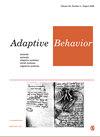Environmental complexity, cognition, and plant stress physiology
IF 1.3
4区 计算机科学
Q4 COMPUTER SCIENCE, ARTIFICIAL INTELLIGENCE
引用次数: 0
Abstract
Facing stress and producing stress responses are crucial aspects of an organism’s life and the evolution of both its species and of the other species in its environment, which are co-evolving with it. Philosophers and biologists emphasize the importance of environmental complexity and how organisms deal with it in evolution of cognitive processes. This article adds to these discussions by highlighting the importance of stress physiology in processes connected to plant cognition. While this article supports the thesis that life means cognizing (i.e., sensing the environment, arranging internal processes according to that perception, and affecting the environment with its actions), it also emphasizes that there are various kinds of organisms. In this regard, plant cognition is not animal cognition. However, given both the variety and continuity in evolutionary processes and the similarities even between the distantly related organisms in the tree of life, I argue that it is usually useful to consider and compare physiological and molecular mechanisms in plants and animals as well as the concepts and research processes in animal and plant science. Although the “pathological complexity” thesis that Veit (2023) presents is fruitful in considering the evolution of consciousness and cognition, I argue that, when thinking of biological processes in relation to cognition, stress can be a helpful concept (maybe even as suitable as pathological complexity) in thinking of organisms’ responses to environmental complexity and their adaptation and acclimation processes.环境复杂性、认知和植物应激生理学
面对压力和产生压力反应是生物生命的关键环节,也是生物物种和环境中与生物共同进化的其他物种进化的关键环节。哲学家和生物学家都强调环境复杂性的重要性,以及生物如何应对环境复杂性对认知过程进化的影响。本文通过强调压力生理学在植物认知过程中的重要性,为这些讨论添砖加瓦。本文支持生命意味着认知(即感知环境,根据感知安排内部过程,并通过行动影响环境)这一论点,同时也强调生物有多种类型。在这方面,植物认知不是动物认知。不过,鉴于进化过程的多样性和连续性,以及即使在生命树中亲缘关系较远的生物之间也有相似之处,我认为,考虑和比较动植物的生理和分子机制以及动植物科学的概念和研究过程通常是有益的。虽然维特(2023)提出的 "病理复杂性 "论点在考虑意识和认知的进化方面很有成效,但我认为,在考虑与认知有关的生物过程时,压力可以是一个有用的概念(甚至可能与病理复杂性一样合适),有助于考虑生物对环境复杂性的反应及其适应和适应过程。
本文章由计算机程序翻译,如有差异,请以英文原文为准。
求助全文
约1分钟内获得全文
求助全文
来源期刊

Adaptive Behavior
工程技术-计算机:人工智能
CiteScore
4.30
自引率
18.80%
发文量
34
审稿时长
>12 weeks
期刊介绍:
_Adaptive Behavior_ publishes articles on adaptive behaviour in living organisms and autonomous artificial systems. The official journal of the _International Society of Adaptive Behavior_, _Adaptive Behavior_, addresses topics such as perception and motor control, embodied cognition, learning and evolution, neural mechanisms, artificial intelligence, behavioral sequences, motivation and emotion, characterization of environments, decision making, collective and social behavior, navigation, foraging, communication and signalling.
Print ISSN: 1059-7123
 求助内容:
求助内容: 应助结果提醒方式:
应助结果提醒方式:


